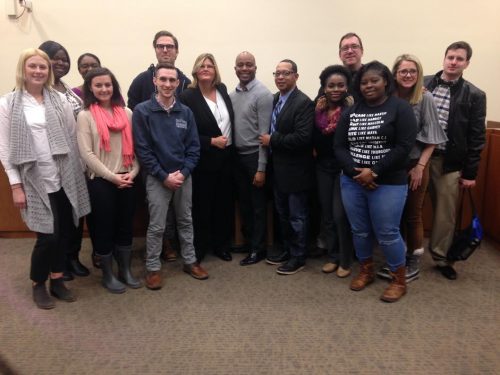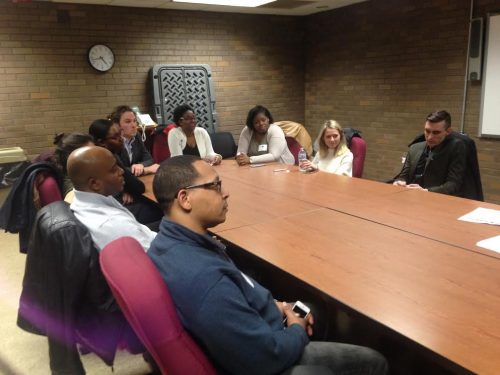While many students were relaxing or seeing family over their spring breaks, a group of 12 DePaul students was teaching legal lessons to teenagers at the Juvenile Temporary Detention Center (JTDC) as part of a collaboration between three law centers to help DePaul students understand the juvenile justice system and provide incarcerated teens legal advice and information.
For the past eight years, DePaul students have spent a few hours a day meeting judges, attorneys and other legal personnel at JTDC before spending an hour talking to students.

Their interactions can take multiple forms: playing legal games related to encounters with law enforcement or having discussions with the students about the legal system or the juvenile justice process from arrest to court or parole. The goal of this dialogue is to understand issues surrounding the juvenile justice system and give back to the community.
The trip was organized by Cheryl Price, executive director of the Schiller, DuCanto & Fleck Family Law Center, Tom Judge, chaplain to the College of Law and to the College of Computing and Digital and Shaye Loughlin, director of the Center for Public Interest Law.
“The reason I think students find it appealing is that it really immersed them into very serious issues of social justice, youth violence, education and the future of the generation,” Judge said. “It also challenged them to think about what they, as law students and future lawyers, were going to do about it.”
The program, Price said, draws on Vincentian values to help students work with vulnerable and marginalized populations, as well as “expose (students) to some of the inequities in the criminal justice system.”
“I think actually meeting the youth is really impactful because you learn in a very short amount of time that they’re kids and not just a statistic,” Price said. “You get a sense that they have hopes and dreams. I think this is how the project changes hearts and minds about our juvenile justice system.”

For Zipporah Freeman, a first year law student, the experience was a powerful one that provided inspiration for her future career, whether that be in juvenile justice or not.
One of the most powerful experiences for Freeman was hearing from a former incarcerated teen who is now attending a four-year university studying business. He told his own story — how he ended up at JTDC — and how he began to change his life. The most thought-provoking part of the story, for Freeman, was the metaphor: one of broken foundations that started with slavery, led to Jim Crow and has been remodeled to create mass incarceration.
“At the end of the day, I realized there’s so many problems with the social systems in the city and in the county,” Freeman said. “Every social system has failed them — housing, healthcare, employment, education — and there are so many issues across the board.”
This service project, Freeman said, helped open her eyes to all of these social justice issues and how they’re compounded by one another. She said she and others who taught at JTDC realized that it was their professional duty to create change, no matter what field of law they decide to go into.
This was partly the goal of the trip.
“There are real problems that I think that we need to address,” Judge said. “I think problems around lack of access to education, to justice, to good employment — if we, whether me as an individual, DePaul College of Law or an even greater community, can try to engage with young people, I think statistically we see that that makes a bigger difference.”

